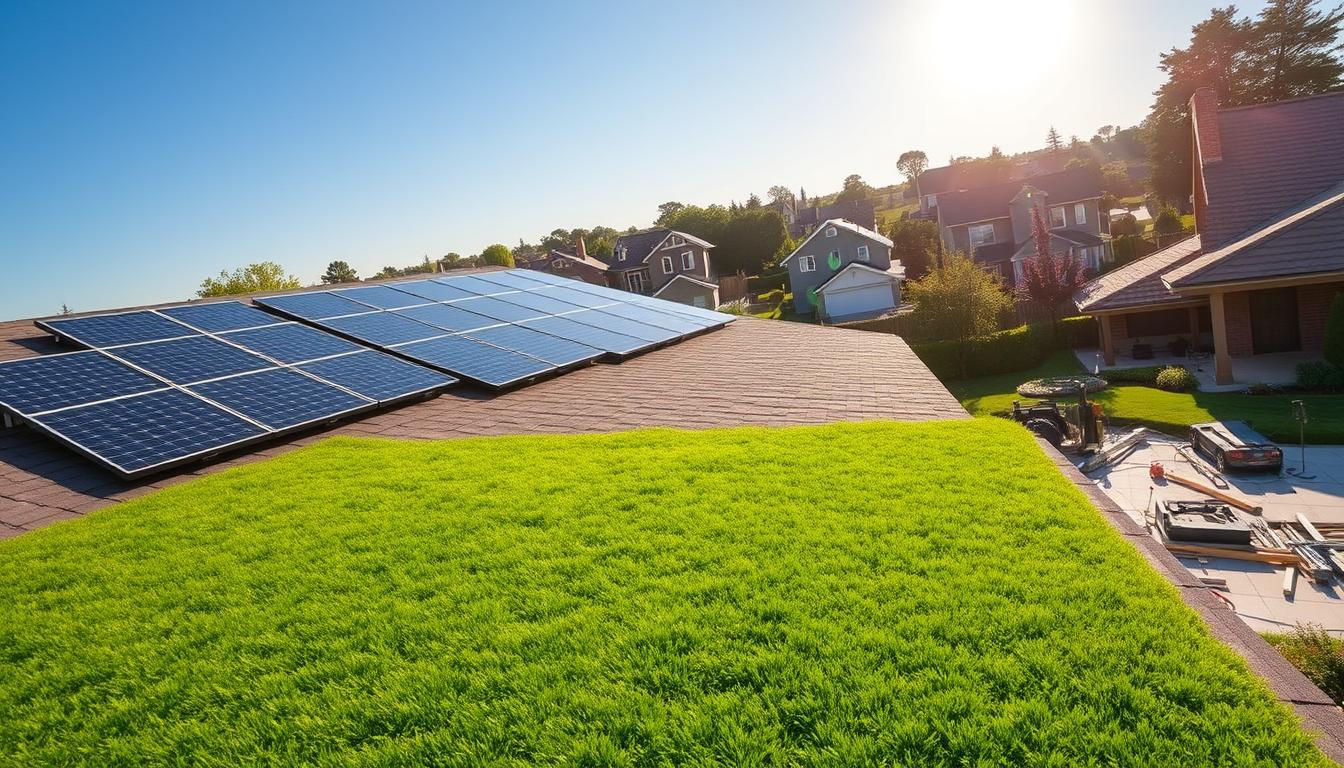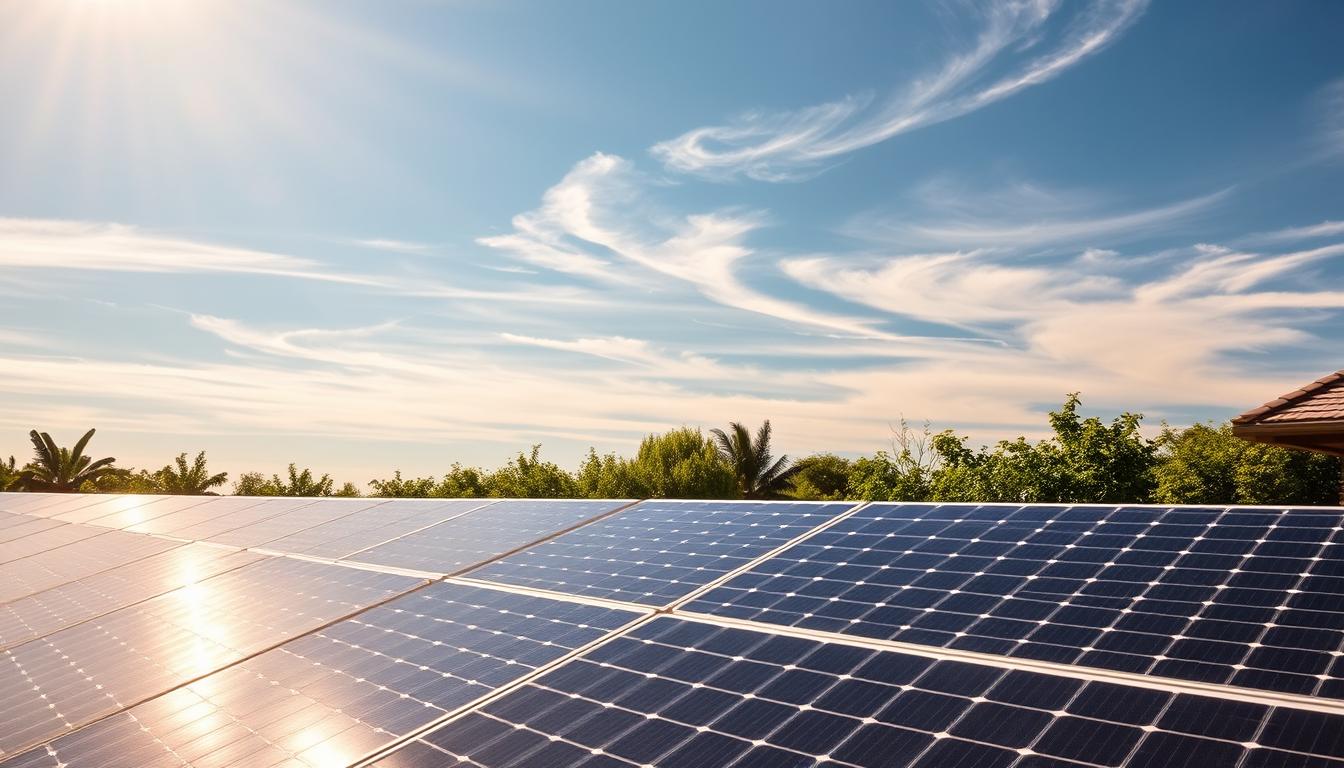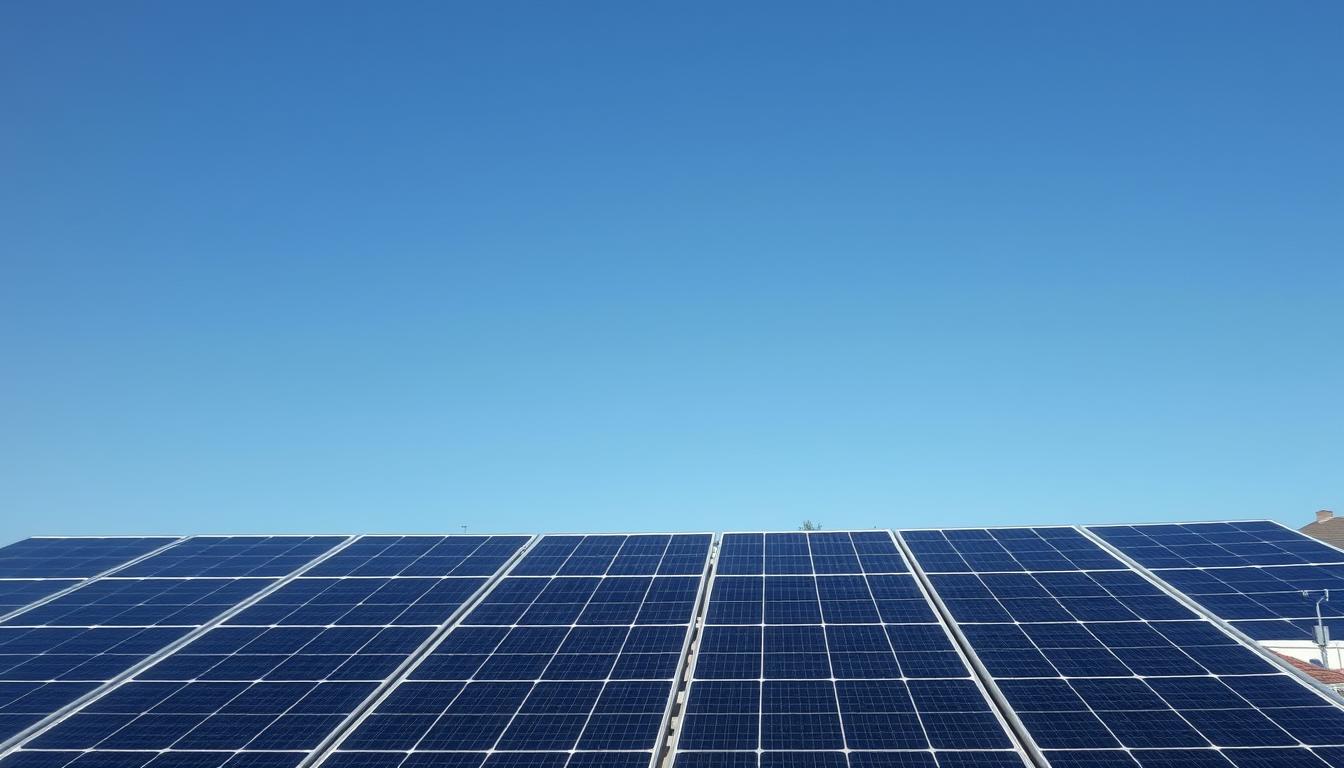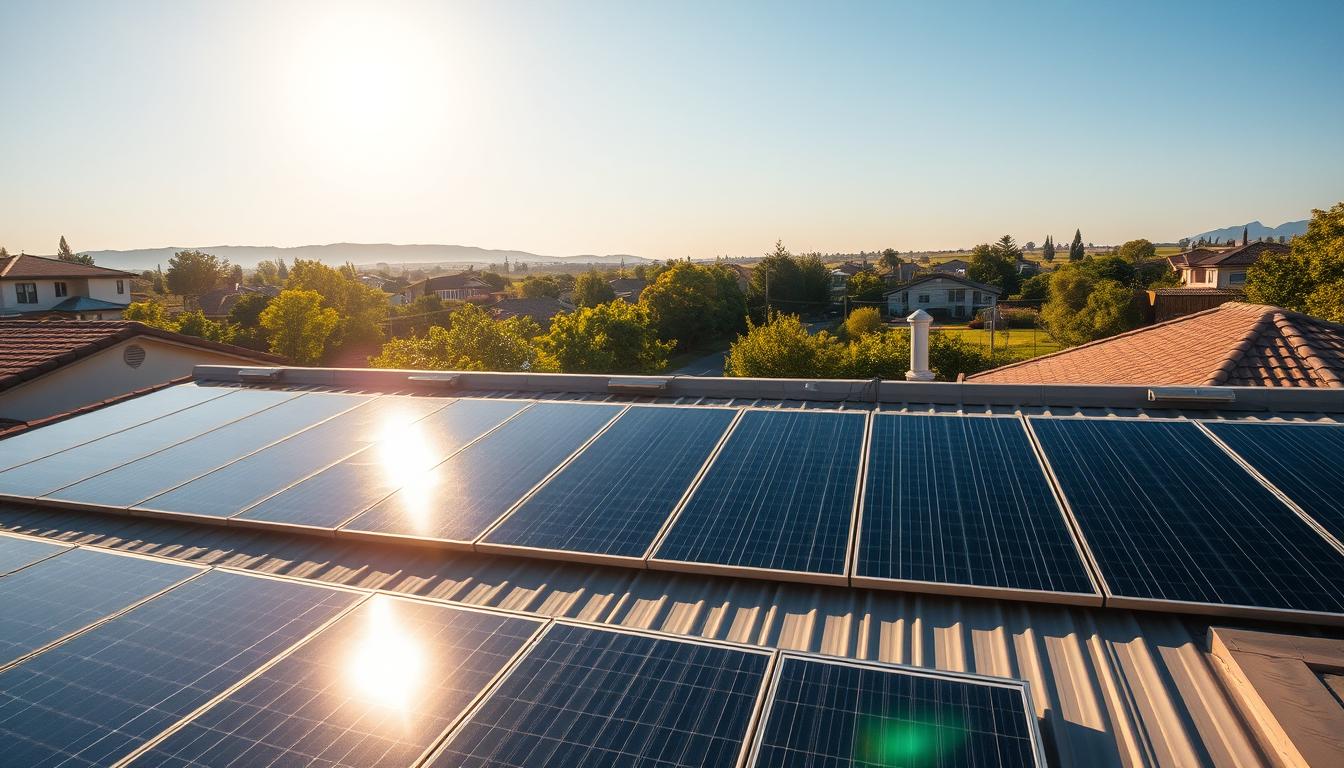Thinking about using solar power at home but don’t know where to begin? The demand for solar panels is growing fast. The U.S. Department of Energy says hundreds of thousands of panels have been installed, making solar energy cheaper for people1. To power a typical home, you’ll need about 21 to 34 panels1.
When you start, you’ll find out about financing options. These include $0 down and low-interest rates, if you qualify1. To save money, you should plan to stay in your home for at least 2 years1. Adding solar to a new home is cheaper than adding it later1. Solar can cut your electricity bills, saving you thousands1.
Key Takeaways
- Streamlining the solar panel installation process is key for a smooth experience
- Knowing the benefits of solar, like lower bills and higher home value, is important
- There are financing options, like $0 down and low-interest rates, for solar panels
- Using solar can save you thousands over time1
- Installing solar can boost your home’s value by about 4.1%, or around $15,000 for a typical home2
- A 30% federal tax credit is available for solar installations from 2022 to 20323
Understanding Solar Energy and Its Benefits
Solar energy is a clean and renewable source of power. It cuts down on our use of fossil fuels and lowers harmful emissions4. With the right installers, homeowners can save on their energy bills. The National Renewable Energy Laboratory says solar energy can cut bills by up to $500 a year5.
Using solar energy has many perks. It can lower your bills, increase your home’s value, and reduce your carbon footprint. Homes with solar panels sell for about 3.74% more than similar homes without them5. On average, solar systems can boost your home’s value by around $14,3295.
Some key benefits of solar energy are:
- Renewable and sustainable source of energy
- Low maintenance and operating costs
- Increased property value
- Reduced carbon footprint
Businesses can also benefit from solar energy through commercial solar installation. This option is both cost-effective and eco-friendly. By choosing the best installers and going for affordable installation, both homes and businesses can enjoy solar’s benefits while helping the planet4.
Choosing the Right Solar Panels
Homeowners have many options when picking solar panels. Professional solar panel installation companies can guide you. They help find the perfect match for your needs. The type of panel affects efficiency and cost, as the U.S. Department of Energy6 explains. Companies offer local services for a smooth installation.
When choosing, consider efficiency, cost, and durability. The average home uses about 10,500 kWh a year7. A solar system should match or slightly exceed this amount7. Here are some panel types:
- Monocrystalline panels
- Polycrystalline panels
- Thin-film panels
Warranty and efficiency are also important. Panels usually come with a 25-year warranty6. They lose about 2% in the first year and 0.5% each year after, keeping 84% efficiency after 25 years6. Choosing wisely and using local services ensures a good solar installation.
| Type of Solar Panel | Efficiency | Cost |
|---|---|---|
| Monocrystalline | 20% | High |
| Polycrystalline | 15% | Medium |
| Thin-film | 10% | Low |
The Solar Panel Installation Process
The solar panel installation process might seem complicated, but it’s broken down into simple steps. It starts with a consultation and site assessment. A professional will check your home’s solar readiness and create a plan for your solar system8. They’ll find the best spot for your panels and make sure your system fits your energy needs.
The next steps include mounting the panels, connecting the electrical parts, and checking the system. The Solar Energy Industries Association says it usually takes 3-5 days to finish8. Commercial installations might take longer because they’re bigger. From start to finish, it can take 1 to 3 months8.
Here are the main steps in solar panel installation:
- Initial consultation and site assessment
- Customized installation plan
- Mounting the solar panels
- Connecting the electrical components
- Inspecting the system
The cost of solar panels varies, but the average is about $30,000 nationwide8. Thanks to the Federal Investment Tax Credit (ITC), you can save 30% on the cost8. The most efficient solar panel has a rating of 22.8%8.
Choosing a reliable solar panel installer is key. They ensure your system is set up right and meets your energy needs. With proper installation, you’ll see lower bills and a greener footprint. Whether it’s for your home or business, the process is manageable with the right help9.
Evaluating Your Home’s Solar Panel Installation
Before getting solar panels, check your home’s solar readiness. Look at your roof’s condition and how it faces the sun. Also, check for any shadows that might lower your system’s efficiency. Local solar experts can guide you on what’s best for your home.
A roof facing south with little shadow is perfect for solar panels. Most U.S. roofs work well for solar power10. But, think about the costs and benefits, like replacing your roof if needed10.
For a free check, talk to solar companies. They’ll look at your roof, its direction, and shadows. They’ll also suggest the best solar setup for you. Important things to think about include:
- Rooftop space and condition
- Orientation and shading issues
- Local building codes and regulations
- Cost and financing options
With local solar help, you can decide if solar panels are good for your home. They can help you use solar energy and cut down on bills11.
| Factor | Consideration |
|---|---|
| Rooftop space and condition | Ensure sufficient space and a suitable condition for solar panel installation |
| Orientation and shading issues | Assess the impact of shading and orientation on solar panel efficiency |
| Local building codes and regulations | Comply with local regulations and obtain necessary permits |
| Cost and financing options | Explore affordable financing options and calculate the return on investment |
When you think about solar panel installation, understanding permits and regulations is key. Whether you’re looking at residential solar installation or commercial solar installation, knowing the local rules is vital.
The process of getting permits for solar panels can be tricky. It changes from place to place12. To make it easier, research local laws, get the right permits, and use a pro for help13. This way, you can avoid delays and extra costs from not following the rules.
Some important things to think about when dealing with permits and rules include:
- Zoning laws and land use rules
- Building codes and what permits you need
- Environmental laws and checks
By knowing these points and working with a trusted solar panel company, you can make sure your project follows all local rules. This way, you can enjoy solar energy for a long time.
Don’t forget to look into incentives like federal tax credits and state rebates14. They can help lower the cost of your solar panel setup. With the right help, you can get through the permits and rules of solar panel installation. Then, you can start enjoying clean, green energy.
Financial Incentives for Solar Installation
Thinking about solar panels? It’s key to look at the financial help available. Top solar installers can guide you through these benefits. The federal tax credit offers a 30% tax cut for solar installations15. This can lower the cost upfront, making solar more affordable for homeowners.
Companies that offer affordable solar installation can also help with state and local rebates. For example, some states don’t charge sales tax on solar panels, saving you thousands16. Plus, property tax exemptions mean your property taxes won’t go up because of solar panels, which is good in places like California15.
Here are some key financial incentives to consider:
- Federal tax credit: 30% of the total cost15
- State and local rebates: varying amounts, depending on the state and local government16
- Sales tax exemptions: possible savings of thousands, based on local tax rates16
- Property tax exemptions: no increase in property taxes due to solar panel installation15
Working with top solar installers can help you understand these benefits. They can create a plan that fits your needs. This way, you can enjoy solar energy’s benefits while keeping costs down.

By choosing the best solar installers and using these incentives, you can switch to solar energy. This move will save you money in the long run. Always check what incentives are available in your area to save even more15.
| Incentive | Description |
|---|---|
| Federal Tax Credit | 30% of the total cost15 |
| State and Local Rebates | Varying amounts, depending on the state and local government16 |
Finding a Reputable Installer
When looking for solar installation companies, finding a reliable and skilled installer is key. A well-installed solar system works better and lasts longer. Start by searching for local solar services known for their quality in your area.
Check if the installer is certified by the North American Board of Certified Energy Practitioners (NABCEP)17. Look for at least three years of experience in solar installation17. Also, compare prices and services from different installers to find the right one for you.
When choosing an installer, consider their reputation, experience, and how clear they are about costs. Read customer reviews and check ratings on the Better Business Bureau18. Make sure they explain the system and costs clearly.
By carefully researching and comparing installers, you can find a reliable professional for your solar panel installation. This ensures your system works well and efficiently, giving you clean energy for years. For more on solar lights, visit solarpathlights.org.
Here are some questions to ask installers:
- What experience do you have with solar panel installation?
- Can you provide references from previous clients?
- What is your pricing structure, and are there any additional costs?
- How will you ensure that the installation is done correctly and safely?
Maintenance Tips for Solar Panels
As a homeowner with a residential solar installation, regular maintenance is key. Clean your panels 2 to 4 times a year19. Use a soft brush and gentle cleaner. Clean them early in the morning to avoid heat damage19.
Regular checks can spot problems early. This keeps your solar panel installation running smoothly. It ensures you get clean, renewable energy.
For commercial solar installation owners, regular inspections are vital. Dirt and debris can harm performance20. Some companies offer apps for monitoring, but they may cost a bit20.
Investing in maintenance boosts energy output. It can also extend your panels’ life beyond 25-30 years21.
For repairs, it’s best to hire a pro19. Make sure your panels have a good warranty for replacements19. Regular checks and cleaning keep your panels efficient for years.
For more on solar panel care, check out solar path lights tips. Learn how to keep your panels running well.

Regular checks prevent expensive repairs21. Cleaning ensures your panels work at their best21. Prioritize maintenance for efficient, renewable energy, whether at home or work.
Making the Switch to Solar Energy
Switching to solar energy is a smart move for homeowners22. Affordable solar panel installation services can help you save money in the long run. Solar systems can boost your home’s value23 and cut down on energy bills. You might even see a return on investment of up to 10% per year22.
Local solar installation companies22 will guide you through the process. They ensure your system meets all the rules and codes.
The installation usually takes 1 to 2 days23. The whole project can be done in 2 to 6 months23. You can get federal tax credits23, state and local rebates23, and financing options like loans or leases. This way, you can start using solar energy with little to no cost upfront23.
Energy efficiency upgrades can also help. They can lower your solar energy needs22.
The benefits of solar energy are clear. Solar panels can cut down carbon dioxide emissions by up to 100 tons over their life24. This helps make our future cleaner and greener. The solar industry has also created over 250,000 jobs in the U.S24., boosting local economies and communities.
Start your journey towards a greener, more affordable energy future. Contact a local solar installation service today.
FAQ
What is solar energy and how does it work?
What are the benefits of solar energy for homeowners?
What types of solar panels are available for residential installations?
What is the solar panel installation process like?
How do I evaluate my home’s solar panel installation?
What permits and regulations do I need to be aware of?
What financial incentives are available for solar panel installation?
How do I find a reputable solar panel installer?
What maintenance is required for solar panels?
What are the long-term benefits of switching to solar energy?
Source Links
- Solar Panel Installation for Residential Homes – Freedom Solar – https://freedomsolarpower.com/home-solar-installations
- Prepare Your Home for Solar Installation | Summit Energy – https://summitsolar.com/how-to-prepare-your-home-for-solar-installation/
- Free Solar Panels? Don’t Get Burned. – https://www.energy.gov/articles/free-solar-panels-dont-get-burned
- How does solar power work? | Solar energy explained – https://www.nationalgrid.com/stories/energy-explained/how-does-solar-power-work
- Solar Panels 101: A Guide to Solar Energy and Systems – https://unboundsolar.com/solar-information/solar-power-101?srsltid=AfmBOooqh252ao1976bUpXhElbRWiGfBZNsFSkktDroMNtJrIcI9u2Bd
- Solar Panel Buying Guide: Picking the Right Panel for You – https://www.cnet.com/home/energy-and-utilities/solar-panel-buying-guide-everything-you-need-to-know/
- A homeowner’s guide for choosing the right number of solar panels – https://enphase.com/blog/homeowners/homeowners-guide-choosing-right-number-solar-panels?srsltid=AfmBOoqD1b2MKpSiz-4jd2OsTkV-eXJLtPphBgPKsSnDvXIYoZ-Jg_EY
- How to Install Solar Panels – https://www.energysage.com/solar/solar-panel-installation-guide-what-should-you-expect/
- The Solar Panel Installation Process – https://palmetto.com/solar/solar-panel-installation-process
- Assessing Solar Potential for Your Home – https://enphase.com/blog/homeowners/assess-solar-potential-home?srsltid=AfmBOookUzvu4xiMrO-mtDfhBQBoAhjL-mpG66i3z5t5aPzmjy7Q2UyA
- Solar Rooftop Potential – https://www.energy.gov/eere/solar/solar-rooftop-potential
- Permitting and Inspection for Rooftop Solar – https://www.energy.gov/eere/solar/permitting-and-inspection-rooftop-solar
- AHJ Solar: Navigating Local Requirements for Solar Installations — Exactus Energy – https://www.exactusenergy.com/blog/ahj-solar-requirements
- What permits or regulations are required for installing solar panels? (2025) | 8MSolar – https://8msolar.com/what-permits-or-regulations-are-required-for-installing-solar-panels/
- Solar Rebates and Incentives – https://www.energysage.com/local-data/solar-rebates-incentives/
- Residential Clean Energy Credit | Internal Revenue Service – https://www.irs.gov/credits-deductions/residential-clean-energy-credit
- Decisions, Decisions: Choosing a Solar Installer – https://www.energy.gov/eere/solar/articles/decisions-decisions-choosing-solar-installer
- Find the Best Solar Installers Near You With These 7 Tips – https://www.cnet.com/home/energy-and-utilities/best-solar-installers-near-you/
- Solar Panel Maintenance: Everything You Need To Know – https://www.solarreviews.com/blog/solar-panel-maintenance-everything-you-need-to-know
- Solar Panel Maintenance Guide: Keep Your Panels Clean – https://www.cnet.com/home/energy-and-utilities/solar-panel-maintenance-guide-how-to-clean-and-repair-solar-panels/
- Do’s & Don’ts of Maintaining Your Solar Panel System – https://solartechnologies.com/dos-donts-of-maintaining-your-solar-panel-system/
- Homeowner’s Guide to Going Solar – https://www.energy.gov/eere/solar/homeowners-guide-going-solar
- Making the Switch to Residential Solar: A Step-by-Step Guide – https://palmetto.com/solar/making-the-switch-to-residential-solar-a-step-by-step-guide
- The Benefits of Switching to Solar Energy | Icon Solar – https://iconsolar.com/the-benefits-of-switching-to-solar-energy/




